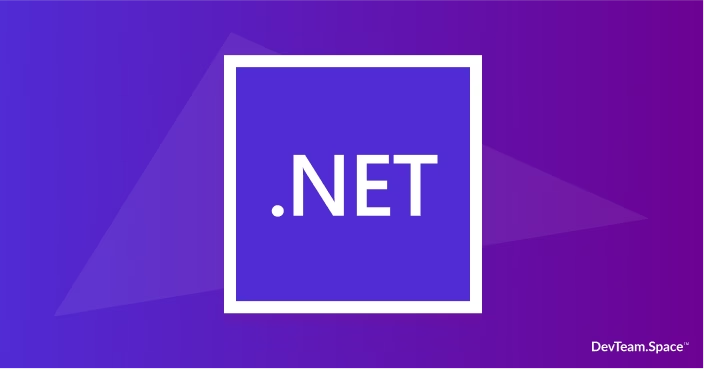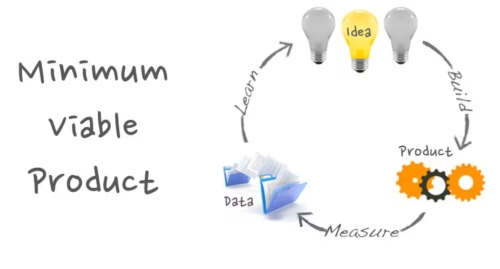Are you interested in hiring .NET developers?
.NET developers build apps for the web, mobile, desktop, IoT, and cloud spaces. This article will answer all the most popular questions about hiring .NET engineers, .NET developers' costs, salaries in 2025, and many more.
Organizations continue to use the .NET framework to build a wide variety of software solutions for almost every industry you can name.
Microsoft launched the .NET Framework in 2002, and it remains one of the most popular frameworks today. Its lengthy popularity can be attributed to its many essential advantages:
1. To begin with, .NET is an open-source framework with a large development community. It supports multiple operating systems, such as Windows, Linux, and macOS.
2. This cross-platform framework helps you to build apps for the web, mobile, desktop, and cloud spaces. It enables code reuse for different platforms, meaning that you can deploy your app to mobile, web, desktop, and embedded devices using one codebase.
3. The UI framework of .NET enables you to develop the front end of your web app in C#. It helps you to develop cloud-based apps and microservices. You can use .NET for creating games, IoT (Internet of Things) apps, and ML (machine learning) systems, too.
4. .NET is fast and has a large ecosystem. Therefore, you can easily find useful development, testing tools, etc.
Naturally, because of its many advantages, .NET developers are in demand. As such, you might find it hard to hire skilled .NET programmers.

Get a complimentary discovery call and a free ballpark estimate for your project
Trusted by 100x of startups and companies like
It is vital that you plan ahead and make the right hiring decisions. For example, hiring freelancers might seem to be a great way to save money, however, the risks tend to be high. Your best bet is to hire developers from a trusted software app development company that outsources its developers. More on that later.
Before you begin, you need to know what skill requirements you will need from your developer. These are as follows:
Primary .NET developer skills
A Net developer’s skills are as follows:
- Deep knowledge of the .NET framework;
- Sound knowledge of .NET Core;
- Proficiency in the .NET platform;
- Good knowledge of current .NET frameworks and technologies, like Visual Basic (VB), ASP.Net Web Forms, ASP.Net MVC, ASP.Net Core, Web API 2, Entity Framework, etc.,
- Proficiency in C#;
- Expertise in Microsoft Visual Studio;
- Good understanding of object-oriented programming;
- In-depth knowledge of .NET Core development;
- Sound understanding of Common Language Runtime (CLR);
- Good knowledge of aspects like the framework class library, entity framework, .NET Core development, etc..
- In-depth knowledge of SQL vs NoSQL databases;
- Experience in Microsoft SQL Server, MySQL, MongoDB, PostgreSQL, or other popular databases;
- Understanding of Unit testing, integration testing, regression testing, automated testing, etc.
- Knowledge of DevOps processes, methods, tools, and practices.
Other software development skills
.NET developers need the following additional skills:
Application security skills needed in .NET projects
No matter which industry you target, you will likely process some sensitive data in your software apps. Cybercriminals want to lay their hands on that data. Hackers routinely target mobile applications, web applications, and legacy systems.
Data privacy and security are vital considerations when planning software application development projects. You need developers who know how to secure software systems.
You should look for developers with knowledge in the following areas:
- Mitigating important application security vulnerabilities;
- Securing APIs that you develop in-house;
- Implementing encryption for data-at-rest and data-in-transit;
- Utilizing tools and techniques like antivirus, firewalls, and digital signatures;
- Making smart use of cloud infrastructure;
- Supporting security and compliance testing.
You need developers who proactively identify and rectify bugs. Hackers often exploit bugs in programs to launch cyberattacks. Your .NET developers need to demonstrate a proactive approach toward defect prevention. A good level of past coding experience really helps here.
Code review skills are needed while developing a .NET software application
You can significantly reduce the development costs of a .NET development project if you can detect defects early in the project lifecycle. A code review can help you find defects earlier. However, you need the right team structure to implement code reviews.
As stated before, .NET developers with limited experience might not be able to review code. You should look for developers with code review experience. Such developers need to know about code review strategies and approach code reviews systematically.
Software engineering and software development methodologies skills
Expert .NET programmers need certain important software engineering skills. These are as follows:
- Understanding of functional requirements and non-functional requirements (NFRs);
- Familiarity with the software app development lifecycle;
- Sound knowledge of software development methodologies like agile and waterfall;
- Good understanding of testing and DevOps;
- Familiarity with important testing and DevOps tools;
- Knowledge of coding best practices and guidelines;
- Familiarity with quality management and defect prevention.
Software architecture skills that .NET developers need
A .NET developer's skills must include a thorough knowledge of software architecture. A deep understanding of software architecture makes a big difference when developing web APIs or web services. This is true for all programming languages and frameworks, and the .NET Framework isn’t an exception.
Developers should understand important software architectural patterns like microservice architecture. They should also understand the impact of software architectural decisions.
Software testing skills required for .NET developers
.NET developers should have excellent software testing skills to ensure the quality and reliability of their software products. Some key software testing skills include the following:
- Test planning
A .NET developer should be able to create test plans for software apps. This includes understanding project requirements, identifying test objectives, creating test cases, defining test data and environments, etc.
- Unit testing
Developers should have expertise in unit testing using frameworks such as NUnit, MSTest, etc. They should be able to write and execute individual unit tests and detect bugs early on in the development phase.
- Integration testing
.NET developers need to have a thorough understanding of integration testing to ensure that different modules in .NET applications function and interact properly. This also includes testing various API integrations.
- Performance testing
.NET developers should ensure the software application works seamlessly under various load conditions. Expertise in performance testing using tools like Visual Studio Load Testing helps developers ensure the responsiveness, scalability, and stability of .NET applications in different environments.
- Test automation
.NET developers need to have the skills to automate various test routines and integrate them into the development procedure. This includes writing test routines, building continuous integration/ continuous deployment (CI/CD) pipelines, etc. Developers should be familiar with various automated testing tools, like Selenium WebDriver, Coded UI, etc., that are used to facilitate these tasks.
- Bug tracking and reporting
Your .Net developers should have proficiency in bug-tracking tools, such as TFS, Jira, etc. These tools allow developers to log, track, and manage code bugs.
Moreover, developers should be able to document and communicate the project issues with other developers and team members. Accurate documentation, like test plans, test scripts, test reports, etc., helps to ensure transparency, traceability, and collaboration within the project team.
Continuous integration and deployment skills for a .NET developer
.NET developers should be extensively familiar with continuous integration/continuous deployment pipelines and tools like Jenkins, AzureDevOps, etc. These tools help with the automation of build processes, test routines, and deployment of .NET applications in various environments.
Skill requirements for .NET application performance optimization
.NET developers should have the skills to ensure the performance and efficiency of .NET software. They should know techniques for performance tuning, such as efficient algorithm design, lazy loading, memory management, asynchronous programming, etc.. to optimize speed and resource utilization in a .Net application.
Your developers should also be familiar with performance tuning and optimization tools like Visual Studio Profiler, which help analyze performance bottlenecks in your application code. Microsoft Message Analyzer is another tool your developers should know. It helps visualize network traffic, including communication between client and server applications, in addition to identifying performance issues and optimizing network communication in .Net applications.
.NET developers also need skills in cache management to store frequently accessed data. This helps improve response times and reduce the load on external resources.
Competencies that an expert .NET developer needs
Hire .NET developers with a few important competencies. While people often call these competencies “soft skills”, they are crucial for success. These are as follows:
Hire expert developers for your next project
1,200 top developers
us since 2016
- Communication skills
Communication is very important in all projects, and .NET projects are no exception. You should pay even more attention to this if you hire remote developers. - Teamwork
The software application development industry has its own unique complexities. Software app development teams often don’t have an easy road to success, therefore, teamwork is crucial. - Passion for excellence
The .Net technology stack offers several advantages, however, the .Net development landscape is competitive. You need to offer a great user experience to your customers. For this, developers need a passion for excellence. - Commitment
.NET development projects can be complex and uncertain. You still need to meet the project scope, budget, schedule, and quality requirements. Look for developers with a sense of passion for your project; this fuels a strong sense of commitment. - Empathy
Whether you are developing enterprise solutions or web apps, you need to meet the business needs of customers. Your developers first need to understand what the end users need. They need empathy for this.
How to find the best .NET programmers?
Now that you understand the skills required to develop .NET applications, you can begin the hiring process. Take the following steps:
1. Decide the kind of platform to hire .NET developers
The web and mobile development landscape is highly competitive. End-users might often have a short attention span. Your web or mobile app needs to make a positive impression within a very short window.
You can attract and retain end-users only if you offer them what they need. This is true for all applications, including .NET technologies. You need the right people to succeed in this competitive space; therefore, you need to make the right hiring decisions. Choosing the right hiring platform is one such key decision.
You have the following options:
Freelance platforms
You might feel tempted to hire freelancers with knowledge of the .NET tech stack. After all, freelance platforms enable you to negotiate a favorable hourly rate.
We don’t recommend this approach to try to reduce the estimated cost for .NET development. At best, hiring freelancers might suffice for simple projects. You should hire dedicated .NET developers for medium- or high-complexity projects.
We say this due to the risks involved with freelancers. They work part-time on your project. You might not get enough bandwidth from them since they have multiple projects going at once; therefore, balancing their work for all their projects can be hard. Because of this, you will find it harder to manage their work if you hire remote freelancers.
Freelance platforms don’t offer any project management support. Freelancers might leave your project mid-way, and you will need to hire replacement developers. It is likely that if you end up hiring freelancers, you will end up paying more.
Trustworthy software development company
We recommend you hire dedicated developer talent from a trustworthy software development company like DevTeam.Space. Companies like ours offer highly skilled and experienced developers. Our vetting process ensures quality and all of our developers work for us on a full-time basis. We routinely encourage our developers to upskill, therefore, they are highly motivated.
DevTeam.Space also provides management support to help take the load off your project manager. Our dedicated account managers work closely with you at all times. These account managers provide management oversight for the work done by our developers. We recommend that you hire from DevTeam.Space for medium- and high-complexity development projects
2. Interview the .NET developers
You have chosen a hiring platform and posted your job requirements. The hiring process now moves to the interview phase (this is much less critical when hiring from software development companies like DevTeam.Space as they have already vetted their developers)
If you don’t have the background required, you can reference our resource on the 20 .NET Developer Interview Questions and Answers. We have also included a few good examples at the end of this article to help you.
Do cover all the key technical areas when interviewing candidates. Don’t confine yourself to the theoretical questions only. Ask questions that help you to assess the relevant experience of developers.
A good idea is to focus on functionalities similar to yours that they have built in the past. Also, assess how the candidates have solved real project problems. Explain the business requirements of your project. Ask how developers would approach such a project. You should expect specific answers; therefore, don’t satisfy yourself with general jargon.
3. Provide detailed information about your application development project
You have found the right .NET developers and need to onboard them to your project. Effective onboarding makes a difference in regard to developer productivity, particularly as they get up to speed. Provide all the necessary information about the project to your new developers.
Share the relevant project documents. These should include business requirements, technical solutions, technical specifications, test plans, etc. Explain the project requirements to your new team members.
Grant access to the project’s technical environment, i.e. the new developers need access to the code repository and other relevant tools.
Introduce your existing team to your new developers. Explain the roles and responsibilities of the new developers and the existing team members. Ensure good communication from the start.
Describe the project schedule and, furthermore, explain the project plan. Discuss the project milestones and deliverables. Set up an effective communication process and establish accountability.
Interviewing tips to hire Dot Net developers
Take a look at the following tips when you hire a .NET developer:
A. Look for developers with experience in delivering non-functional requirements (NFRs)
.NET is a powerful framework that offers performance and scalability. You need developers who know how to use it effectively. Look for developers who have already developed scalable, performant, maintainable, and testable apps using the .NET framework.
B. Hire a smart team leader if you hire remote developers
You might opt to hire a remote team, which gives you access to a global talent pool. Many organizations have benefited considerably by using remote teams. However, you need a competent team leader in a remote team. Such team leaders help you manage the work of the remote team.
C. Hire a complete development team instead of individual developers from various platforms
You might need to hire more than one developer for your project. We recommend you hire a complete development team from a software development company like DevTeam.Space. Such teams are cohesive as they work together on a daily basis. Hiring individual developers from different platforms might result in programmers working silos. On the other hand, DevTeam.Space teams work as efficient, well-oiled teams.
Examples of coding questions to ask during the interview when hiring React Native developers
Ask questions that help you assess the hands-on skills of .NET developers. Avoid asking theoretical questions only. The following are a few examples of questions to ask:
Q1. Can you explain the differences between .NET Framework and .NET Core?
Answer:
Hire expert developers for your next project
.NET Framework and .NET Core are both frameworks used for building applications on the Microsoft platform, but they have key differences:
.NET Framework: It is the traditional framework and has been around since the early 2000s. It's Windows-centric and provides a comprehensive set of libraries and APIs for building desktop, web, and server applications. However, it is tied to Windows and does not offer the same level of cross-platform support as .NET Core.
.NET Core: Introduced as an open-source, cross-platform alternative to the .NET Framework. It allows developers to build applications that can run on Windows, Linux, and macOS. It is more lightweight, modular, and designed for modern, cloud-native scenarios. It also has better performance due to the modular and optimized nature of its components.
As of the .NET 5 release, Microsoft has unified the .NET Framework and .NET Core into a single platform called .NET, further emphasizing cross-platform compatibility.
Q1: What is Dependency Injection, and how does it improve software development?
Answer:
Dependency Injection (DI) is a design pattern used in software development, particularly in object-oriented programming, to achieve loosely coupled and maintainable code.
Explanation:
In DI, instead of having components or classes directly create their dependencies (other classes or services they rely on), these dependencies are passed into the component from the outside. This is usually done through constructor injection, property injection, or method injection.
Example:
// Without Dependency Injection
public class OrderService
{
private readonly OrderRepository _orderRepository;
public OrderService()
{
_orderRepository = new OrderRepository();
}
// ... other methods that use _orderRepository ...
}
// With Dependency Injection
public class OrderService
{
private readonly IOrderRepository _orderRepository;
public OrderService(IOrderRepository orderRepository)
{
_orderRepository = orderRepository;
}
// ... other methods that use _orderRepository ...
}Benefits of Dependency Injection:
Decoupling: DI reduces the direct dependencies between components, making it easier to change or update individual parts of the application without affecting others.
Testability: It simplifies unit testing as dependencies can be easily mocked or substituted during testing, allowing for isolated testing of individual components.
Flexibility: By injecting dependencies from the outside, different implementations can be swapped easily, facilitating modularity and flexibility in the application.
Q3: How does C# handle multiple inheritance, and what alternatives does it offer?
Answer
C# does not support multiple inheritance in the traditional sense, where a class can directly inherit from multiple base classes. This was a design choice to avoid the "diamond problem," a situation where multiple base classes could lead to ambiguity and complexity.
Explanation:
However, C# offers alternatives to achieve similar functionality while maintaining a simpler and more manageable inheritance model:
Single Inheritance with Interfaces: C# supports multiple interface inheritance. Interfaces are pure abstract classes that define a contract without implementation. A class can implement multiple interfaces, allowing it to inherit behavior from multiple sources.
Example:
public interface IShape
{
void Draw();
}
public interface IMovable
{
void Move();
}
public class Circle : IShape, IMovable
{
public void Draw()
{
// Draw circle implementation
}
public void Move()
{
// Move circle implementation
}
}Composition: Instead of using multiple inheritance, C# encourages composition, where a class can contain instances of other classes (also known as components) and delegate specific tasks to those instances.
Example:
public class Engine
{
public void Start()
{
// Engine start implementation
}
}
public class Car
{
private readonly Engine _engine;
public Car()
{
_engine = new Engine();
}
public void StartCar()
{
_engine.Start();
// Other car-specific start actions
}
}By using interfaces and composition, C# provides a more flexible and robust way to achieve code reusability and modularity without the complexities of multiple inheritance.
Submit a Project With Zero Risk
Despite being one of the most popular frameworks, .NET development is complex and requires good developers to get it right. Why take the risk of hiring anything but the most suitable talent when developing .NET solutions?
DevTeam.Space is a community of experienced field expert software developers. All of our dedicated .NET developers have been vetted and trained in our unique agile development process.
We match only the most suitable developer or development team to your project specifications. If you would like to learn more, simply fill out our DevTeam.Space product specification form and one of our experienced account managers will get in touch to answer any questions you might have.












